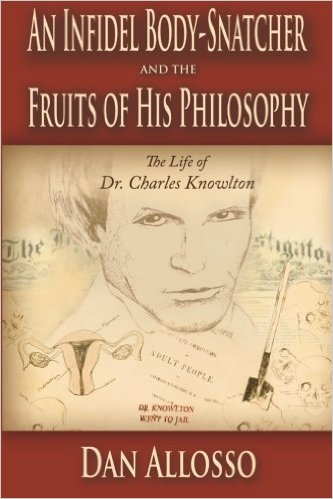Who is an amazing man from the 19th century too many people don’t know about? Charles Knowlton. Now more will, thanks to this excellent biography, An Infidel Body-Snatcher and the Fruits of his Philosophy: The Life of Charles Knowlton by Dan Allosso.
Knowlton was an influential member of the freethinker and social reformer community in the 19th century…
In An Infidel Body-Snatcher and the Fruits of his Philosophy , Allosso takes us through the many challenges he faced throughout his life as he fought for social change.
In this man’s interesting life, we learn how his challenges start long before he’s an adult. They came as a boy when he was told he had a “disease.” Allosso tells us the tragic and almost unbelievable story of being treated for “gonorrheoa Dormientium.” Translation: wet dreams.
Allosso takes us down Knowlton’s road to becoming a medical doctor, which included some bold exploits. “Early 19th century science had only a partial understanding of how the body worked,” and we learn just how Knowlton went about finding out for himself.
Allosso also takes us into Knowlton’s life as a philosopher. Knowlton’s first book, Modern Materialism, presented radical ideas about the physical origins of thought and theories of consciousness which were met with great resistance. Allosso gives readers the hard picture of the prices he paid for trying to sell this book and have his ideas reach the public. Little did society know at the time that this book was ahead of its time in many ways, including contemporary psychologists saying that many of his psychological ideas closely resemble the 20th century theories of behaviorism.
We learn how Knowlton was also ahead of his time when it came to being concerned about overpopulation and what he did about it. He came up with his own solution – he wrote Fruits of Philosophy: A Treatise on the Population Question, the first book on birth control designed for the masses to be able to limit the sizes of their families. It was the first book to hold mindset that parenthood could be a choice.
But like his first book, this one got major push back from religious and legal community, and Allosso gives us wretched tales of how Knowlton was prosecuted for pushing the envelope of social and sexual norms at the time. We also learn about his supporters who understood that the suppression of Fruits of Philosophy was, at the core, a fight for reproductive freedom and freedom of the press.
As a doctor we learn why “he lived a generation too soon to see empirical, scientific search for truth he advocated become the foundation for modern medicine” and “deserves credit for pushing his profession into the future.”
As revolutionary thinker, Allosso lays out in straightforward detail how Knowlton challenged social authority at the time, how he was punished for this, and why he has been largely unrecognized for his thinking.
As social problem solver, you’ll read what happened to Fruits of Philosophy after Knowlton’s death, and how it was the seed for birth control heroes of the future. He led the way for activists like Margaret Sanger, who like him, fought to bring “useful medical information and choice to regular people.”
Allosso says, “In order to raise a new generation to think for themselves, to be freethinkers in today’s age, we need to tell them stories about rebels.”And this is a story about one brilliant rebel indeed.This book tells the story of a man with the guts to live true to himself and the world, and who ends up making major contributions to society as we know it today.


